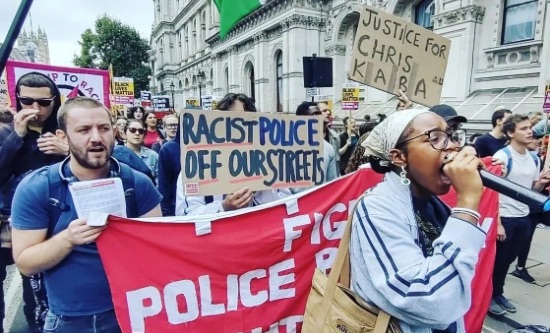
On 5 September 2022, 24-year-old rapper and father-to-be Chris Kaba was executed by Brixton police in south London after a police car rammed into the vehicle he was driving. Kaba was killed by a single shot from a police marksman. He was unarmed. His death is the latest in a long line of deaths at the hands of the British police. NICKI JAMESON and LEV ORFEU report.
The initial police notification published on 6 September stated that ‘specialist firearms officers’ had been ‘in pursuit of a suspect vehicle in the Lambeth area [which] was stopped following tactical contact in Kirkstall Gardens, Streatham Hill.’ Eyewitnesses told the BBC that the police had crashed into the car Kaba was driving, boxed him in and shot him once his car was stationary. No attempt was made to arrest him. Kaba’s father told reporters: ‘For us, it is totally racist and criminal and we want all the community, especially the minority community, to see this as racism.’
It took 11 hours after his death for Chris Kaba’s family to be notified and it was only following a week of protests that the family were eventually told that bodycam footage of the pursuit would be released to them. Jefferson Bosela, Kaba’s cousin, who is the main spokesperson for the family, told the BBC: ‘You know, first we wanted a criminal investigation opened and that took four days, and then the officer being suspended took another two days. So it seems like there’s no urgency in their dealings with this quite tragic matter.’
Protests began almost immediately – firstly outside Brixton police station, then in central London, and subsequently around the country. FRFI comrades have been in touch with family representatives and have participated in the protests nationally, speaking at the demonstrations in London, Brighton and elsewhere.
British police, racist police
Since 1990, 1,833 people in England and Wales have died ‘following contact with the police’. Their deaths are due to negligence and brutality, and often to racism. Black and Asian people are much more likely to be stopped by police, held under the Mental Health Act, and arrested. They also receive lengthier sentences on average and are more frequently remanded in custody. 4,573 (60%) of the 7,630 deaths in detention between 2000 and 2013 involved people who were detained for mental health issues.
Since 1990 there have been 78 fatal police shootings; 33 of them by London’s Metropolitan Police. Chris Kaba’s execution has direct parallels with the shooting of Mark Duggan in north London in 2011. Duggan’s killing and the way in which his family were treated when they went to Tottenham police station looking for answers to questions about what had happened sparked an uprising against police brutality and racism, which swept across London and spread to other English cities. Since 2011 both the police and the Independent Office for Police Conduct have become slightly more wary of being seen to brush aside the concerns of the families lest they get a similar backlash. Nonetheless, the police, media and commentators were once again immediately ready with the same ‘he was no angel’ narrative used to justify the ‘hard stop’ and execution of Mark Duggan.
Same old stories
Looking back at the victims of police shootings – from David Ewin (1995) to Jermaine Baker (2015) – the same ingredients pop up in the mix time after time – the attacks on the character of the victim, the claim that the police acted in self-defence, even though no shots were fired at them and the victim was unarmed. Likewise the same channelling by ‘respectable’ campaigners, Labour MPs, lawyers and NGOs, of the immediate, spontaneous anger on the streets into contained protests and the years’ long wait for legal processes to grind on. Such pacification does not always work. It was the shooting of a black mother, Cherry Groce, in 1985, by police who had come to arrest her son which sparked the Brixton uprising of that year, just as Mark Duggan’s killing set off the 2011 insurrection. In both instances, people took to the streets initially in protest at the specific killing, but also in response to decades of racism and poverty. In many cases, undercover police from the Special Demonstration Squad have spied on campaigns for justice. No Met Police officer has been convicted of murder or manslaughter for any of the shootings, and Cressida Dick, who led the counter-terrorism police operation which resulted in the killing of innocent Brazilian worker Jean Charles de Menezes in 2005, was promoted to Commissioner.
The police do not work freelance. Their actions are not an aberration. Those who kill and assault are not ‘a few bad apples’. The British police force serves the British state – a state run by an authoritarian right wing government, which has no qualms about bombing people across the world, nor allowing the population at home to starve or freeze – all in order to keep turning profits for the ruling class. This anti-working class and racist state has no reservations about killing black men such as Chris Kaba, and this type of repression will only become more brutal as the capitalist crisis intensifies.
As our comrade Destinie Sanchez from South London FRFI said in her speech at the Justice for Chris Kaba demonstration outside the Met Police Headquarters at New Scotland Yard on 10 September: ‘The murder of Chris Kaba at the hands of the Metropolitan Police has shown up yet again the character of the British state as racist to its core … If we want to end once and for all the abuse, mistreatment, and suffering inflicted upon black people by the hands of the state, then we must call for the destruction of the system that has racism at its root … we must call for the destruction of capitalism.’
Fight Racism! Fight Imperialism! No 290, October/November 2022




